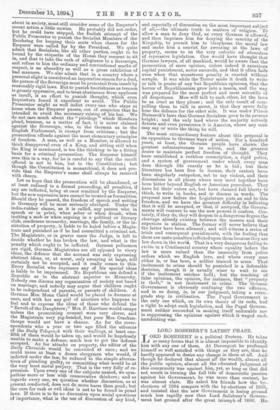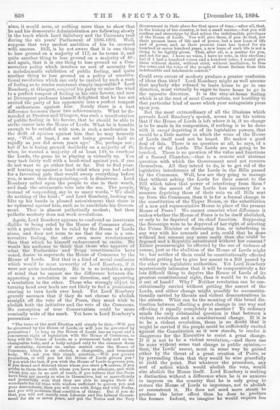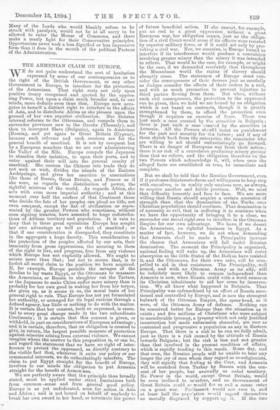LORD ROSEBERY'S LATEST PHASE.
TORD ROSEBERY is a political Proteus. He takes, .4 so many forms that it is almost impossible to identify him with any one of them. At Devonport he professed himself so well satisfied with things as they are, that he hardly appeared to desire any change in them at all. And, though he declared that almost all the wealth, almost all the public opinion, almost all the educated judgment of this community was against him, yet, so long as that did not result in turning the full tide of democratic passion, against his Government, he was more than content, he- was almost elate. He asked his friends how the by- elections of 1894 compare with the by-elections of 1886,, and insisted that the new Government is losing ground much less rapidly now than Lord Salisbury's Govern-- meat lost ground after the great triumph of 1886. Hee aims, it would seem, at nothing more than to show that he and his democratic Administration are following slowly in the track which Lord Salisbury and the Unionists trod during the six years' Parliament of 1886-1892. Well, suppose that very modest ambition of his be crowned with success. Still, is he not aware that it is one thing to lose ground on a majority of 117, as he terms it, and quite another thing to lose ground on a majority of 40; and again, that it is one thing to lose ground on a Con- servative policy which involves no sort of necessity for a melodramatic exhibition of public feeling, and quite another thing to lose ground on a policy of constitu- tional revolution which can only be carried by such a rush of feeling as to render resistance simply impossible P Lord Rosebery, at Glasgow, conjured his party to raise the wind to a perfect tempest of feeling in his own favour, and now at Devonport professes himself delighted that he has not excited the party of his opponents into a perfect tempest of enthusiasm against him. Surely there is a vast aifference between these two achievements. What he de- manded at Preston and Glasgow, was such a manifestation of public feeling in his favour, that he should. be able to strike terror into the House of Lords. What be is humble enough to be satisfied with now, is such a moderation in the drift of opinion against him that he may honestly say, 'Well, at least, I am not losing ground half so rapidly as you did seven years ago.' No, perhaps not ; but if he is losing ground decidedly on a majority of 40, when he wanted a majority of at least 140, to overbear the Lords, the game he is playing is virtually up. You may tack fairly well with a head-wind against you, if you do not want to go either fast or far. But to find your- self beating up against a head-wind when you had asked for a favouring gale that would sweep everything before you, is more than disappointing,—it is disastrous. Lord Rosebery called upon the people to rise in their wrath, and dash the aristocratic veto into the sea. The people, instead of responding, say in so many words, "We shall do nothing of the kind ; " and Lord Rosebery, looking on, lifts up his hands in pleased astonishment that there is no upheaval against him, such as to annihilate his Govern- ment. That is almost pathetically modest; but then pathetic modesty does not work revolutions.
Again, Lord Rosebery appears to confound an inveterate • dislike to being ruled by the House of Commons alone, with a positive wish to be ruled by the House of Lords alone, and does not seem to see that the one is a con- servative feeling, the other even more revolutionary than that which he himself endeavoured to excite. He wants his audience to think that those who approve of what the Forfarshire and Brigg constituencies have voted, desire to supersede the House of Commons by the House of Lords. But that is a kind of moral confusion which would be most unworthy of Lord Rosebery, if it were not quite involuntary. He is in so irritable a state of mind that he cannot see the difference between dis- approving a revolution in one direction, and, approving a revolution in the other. Those who strongly object to turning head over heels are not likely to feel a passionate craving to turn heels over head. Yet Lord Rosebery gravely assumes that if they do not choose to abolish straight off the veto of the Peers, they must wish to abolish both the initiative and the veto of the Commons. No conception of true Conservatism could be more comically wide of the mark. Yet here is Lord Rosebery's peroration :— "The issue at the next Election will simply be this,—Will you be governed by the House of Lords, or will you be governed by yourselves ? r-:.o long as the House of Lords has an equal and a concurrent right of legislation with the House of Commons, so long will the House of Lords, as a permanent body and an un- 43hangeable body, and a body subject only to the common doom of mortality, exercise an undue control over the House of Commons which is an elected, a changeable, and transient body. We ask you this simple question,—Will you govern yourselves, or will you let the House of Lords govern you P If you wish the last, if you wish the House of Lords to govern you, lf you dread and distrust those whom you elect yk.4 rselves, if you prefer to them those with whom you have no relations, and with whom you are in no sort of touch, if you believe that the Peers have been not merely so wise in themselves, but so marvelously and powerfully wise that they are able to inspire their de- scendants for all time with wisdom sufficient to govern you and your descendants, then you will vote with Brigg and with Forfar, and you will maintain that condition of things. But if you do that, you will not merely oust Liberals and the Liberal Govern- ment for six or seven years, and put the Tories and the Tory Government in their place for that space of time,—after all, that, in the history of the country, is but a small matter,—but you will confirm and stereotype by that action the indefensible privileges of the House of Lords. You will give them, if you do that, not their present lease of life and of power, but a new lease of life and of power, and, as their present lease has lasted for six hundred or seven hundred years, a new lease of such life is not a thing to be lightly given. That, after all, is a matter for you, and not for ins. I have no voice, I have no vote, in this election; but if I had a hundred voices and a hundred votes, I would give them without doubt, without stint, without hesitation, to free the votes and the voice of the people of Great Britain from this indefensible and intolerable control."
Could even excess of modesty produce a greater confusion of ideas than this ? Lord Rosebery might as well assume that anybody who refused to leave home to go in one direction, must virtually be eager to leave home to go in the opposite direction. It is the stay-at-home feeling which is at the root of most Conservatism, not hostility to that particular kind of move which your antagonists press upon you. But the most extraordinary of all the illusions which pervade Lord Rosebery's speech, seems to us his notion that if the House of Lords is left where it is, if no change is to be made in its composition, if nothing is to be done with it except depriving it of its legislative powers, that would be a little matter on which the voice of the House of Lords itself need not be heard. He makes a good deal of this. There is no question at all, he says, of a Reform of the Lords. The Lords are not going to be touched. There is no question of the value and functions of a Second Chamber,—that is a remote and abstract question with which the Government need not concern themselves. All they intend to do, is to get rid of the legislative interference of the Lords in the Bills passed by the Commons. Well, how are they going to manage that without asking the Lords for their assent to the Bill which takes that power of interfering from them ? Why is the assent of the Lords less necessary for a measure depriving them of their veto on all Bills sent up from the Commons, than it is for a formal change in the constitution of the Upper House, or the substitution of a new and representative House in place of the present House of Peers ? We cannot conceive what difference it makes whether the House of Peers is to be itself abolished, or only to be deprived of its chief function. Supposing the Sovereign were to be deprived of her right of selecting the Prime Minister or dismissing him, or interfering in any way with his counsels and acts, could that be done without her consent any more easily than she could be deposed and a Republic substituted without her consent P Either process-might be effected by the use of violence of course, just as the abolition of the House of Lords might be ; but neither of them could be constitutionally effected without getting her to give her assent to a Bill passed by the other two legislative authorities. Yet Lord Rosebery mysteriously intimates that it will be comparatively a far less difficult thing to deprive the House of Lords of its greatest constitutional right, than it would be to abolish it out of hand ? Why ? Neither revolution can be con- stitutionally carried without getting the assent of the Lords, and either change might possibly be unconstitu- tionally carried by threats and violent demonstrations in the streets. What can be the meaning of this broad die- tinction between effecting a great change in one way and effecting it equally completely in another ? To ordinary minds the only substantial question is that between a violent revolution and a constitutional change. If it is to be a violent revolution, there is no doubt that it might be carried if the people could be sufficiently excited against the Constitution as it now stands, to render it dangerous for the Executive to resist a great change. If it is not to be a violent revolution,—and there can be none without some vast change in public opinion,— then, the Lords' assent, must in some way be gained either by the threat of a great creation of Peers, or by persuading them that they would be wise gracefully to yield the point. Bat whatever the procedure, any sort of action which would abolish the veto, would also abolish the House itself. Lord Rosebery is making a distinction without a difference when he is so anxious to impress on the country that he is only going to reduce the House of Lords to impotence, not to abolish or reconstruct it. He does not need more steam to produce the latter effect than he does to produce the former. Indeed, we imagine he would require less Many of the Lords -who would blankly refuse to be struck with paralysis, would not be at all sorry to be allowed to enter the House of Commons, and there make a manly fight for their Conservative principles. Opportunism never took a less dignified or less impressive form than it does in the mouth of the political Proteus of the Administration.










































 Previous page
Previous page